Space leaks exploration in Haskell
- Rupanshu, Sumith, Suresh
Leaky space
Mr. X and Ms. Y
advanced language features - lazy evaluation or closures more complex memory layout
harder to predict what memory looks like
potentially leading to space leaks.
Haskell is vulnerable to space leaks and we make this our topic of study.
Lazy evaluation
alive or dead example!
A space leak can occur when the memory contains an expression—where the expression grows regularly but where the evaluated value would not grow. Forcing evaluation usually solves such leaks; this makes evaluation of some variables strict instead of lazy.
f x y = y
f ⊥ b = b
f ⊥ b = ⊥
Lazy Evaluator
Postpone evaluation until it is inevitable.
Lazy evaluation in a nutshell
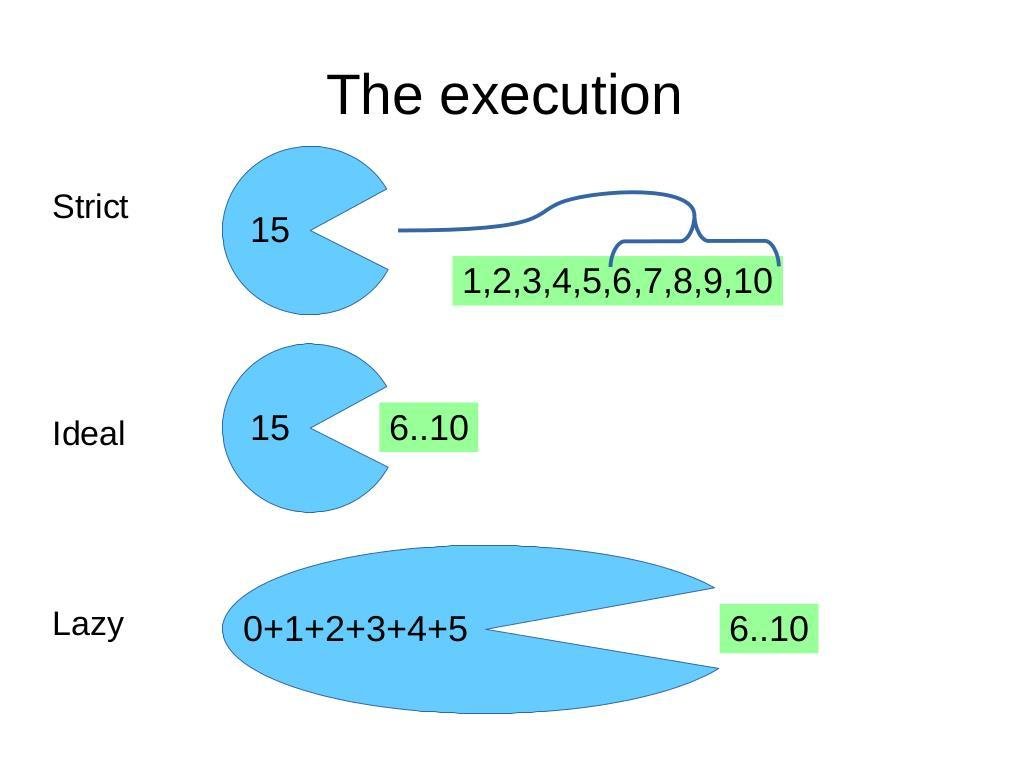
strictness
based
liveness
based
Space Leaks
built up
unevaluated
expressions
keeping not
needed
references alive
- takes two args of any type
- evaluates first
- returns the second
- superficial dependency
seq :: a -> b -> bseq ⊥ b = ⊥
seq a b = bseq2 x y = if (x == 0) then y else yDeclares a function to be strict in an argument.
f !x y = x + y- strict in first argument
- not strict in second argument
- x evaluated to WHNF
- syntactic sugar for seq
Bang Patterns
Profiling
- Compile program with -prof and -rtsopts
- Run program with -p (general profiling)
- And -hx (x -> heap options)
- Use hp2ps to generate graphs from profile
Heap Options
- -hc : Cost Center
- -hy : Type of data
- -hd : Closure description
- -hm : module containing code
RTS options
- -K : set stack size(8M)
- -M : set heap size
- -i : sampling rate
Examples
Strictness based
foldl vs foldl'
foldl f z [] = z
foldl f z (x:xs) = foldl f (f z x) xsfoldl (+) 0 [1..10]
= foldl (+) 0 (1:[2..10])
= foldl (+) (0 + 1) [2..10]
= foldl (+) ((((((((((0 + 1) + 2) + 3) + 4) + 5) + 6) + 7) + 8) + 9) + 10) []
= ((((((((((0 + 1) + 2) + 3) + 4) + 5) + 6) + 7) + 8) + 9) + 10)
= (45 + 10)
= 55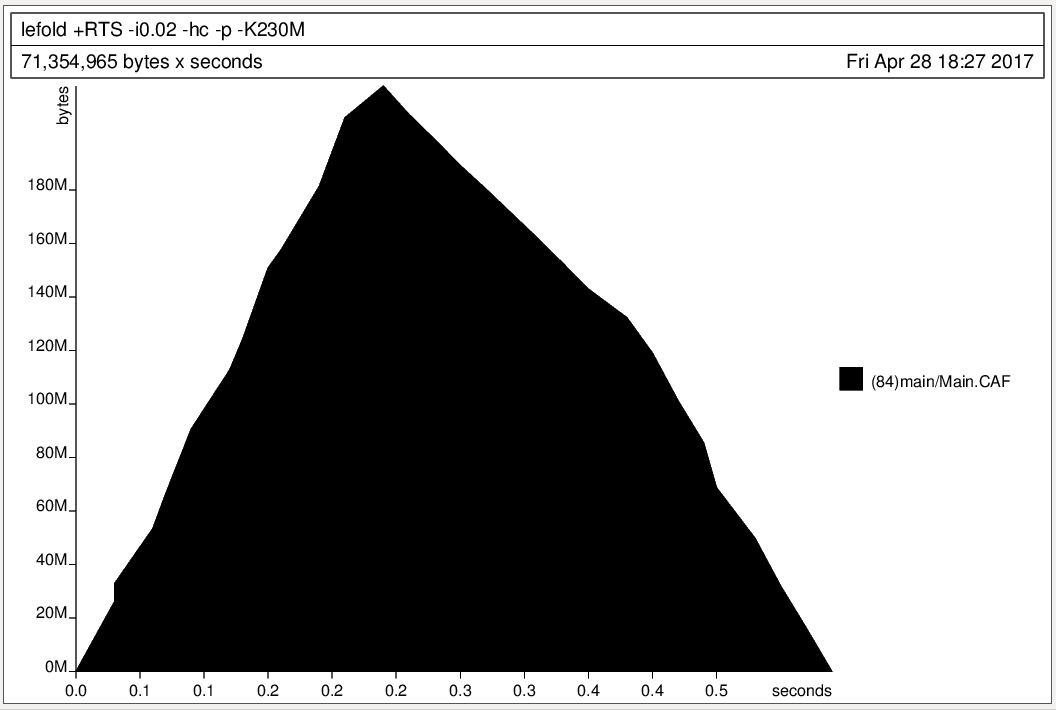
foldl vs foldl'
foldl' f z [] = z
foldl' f z (x:xs) = let z' = z `f` x
in seq z' $ foldl' f z' xs
foldl' (+) 0 [1..10]
= foldl' (+) 0 (1:[2..10])
= foldl' (+) (0 + 1) [2..10]
= foldl' (+) 1 (2:[3..10])
= foldl' (+) (1 + 2) [3..10]
...
= foldl' (+) (45 + 10) []
= foldl' (+) 55 []
= 55
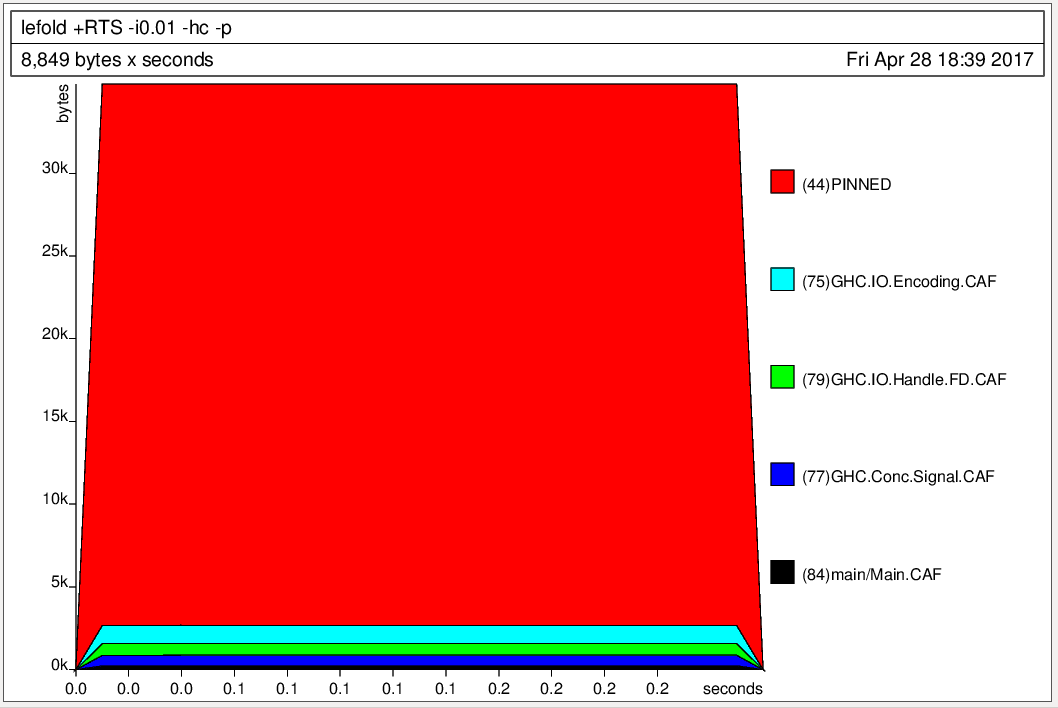
tick
main = print (f ([1..40000000]})
(0 :: Int, 1 :: Int))
f [] c = c
f (x:xs) c = f xs (tick x c)
tick x (c0, c1) = if (even x)
then (c0, c1 + 1)
else (c0 + 1, c1)f [1,2,3,4] (0,1)
= f [2,3,4] (tick 1 (0,1))
= f [3,4] (tick 2 (tick 1 (0,1)))
= f [4] (tick 3 (tick 2 (tick 1 (0,1))))
= f [] (tick 4 (tick 3 (tick 2 (tick 1 (0,1)))))
...
= (tick 4 (tick 3 (tick 2 (tick 1 (0,1)))))
= (tick 4 (tick 3 (tick 2 ((0 + 1),1))))
= (tick 4 (tick 3 ((0 + 1),(1 + 1))))
= (tick 4 (((0 + 1) + 1),(1 + 1)))
= (((0 + 1) + 1),((1 + 1) + 1))
= ((1 + 1),(2 + 1))
= (2,3)
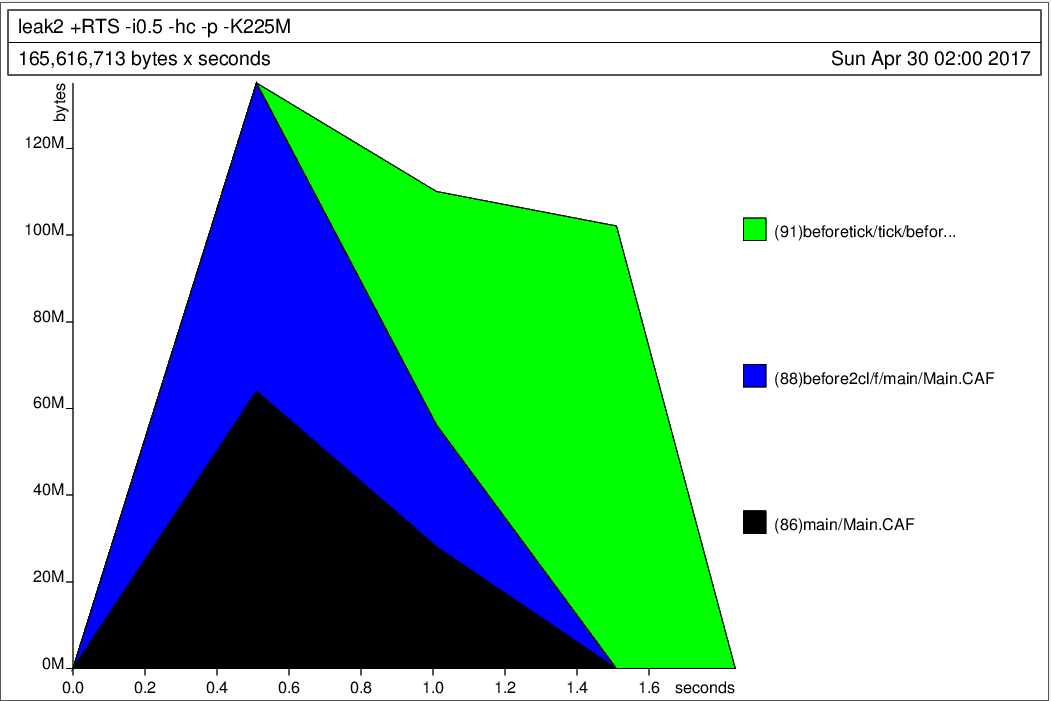
tick
main = print (f ([1..40000000]})
(0 :: Int, 1 :: Int))
f [] !c = c
f (x:xs) !c = f xs (tick x c)
tick x (!c0, !c1) = if (even x)
then (c0, c1 + 1)
else (c0 + 1, c1)f [1,2,3,4] (0,1)
= f [2,3,4] (tick 1 (0,1))
= f [2,3,4] (0+1, 1)
= f [2,3,4] (1, 1)
= f [3,4] (1, 1+1)
= f [3,4] (1, 2)
= f [4] (1+1, 2)
= f [4] (2, 2)
= f [] (2, 2+1)
= f [] (2, 3)
= (2, 3)
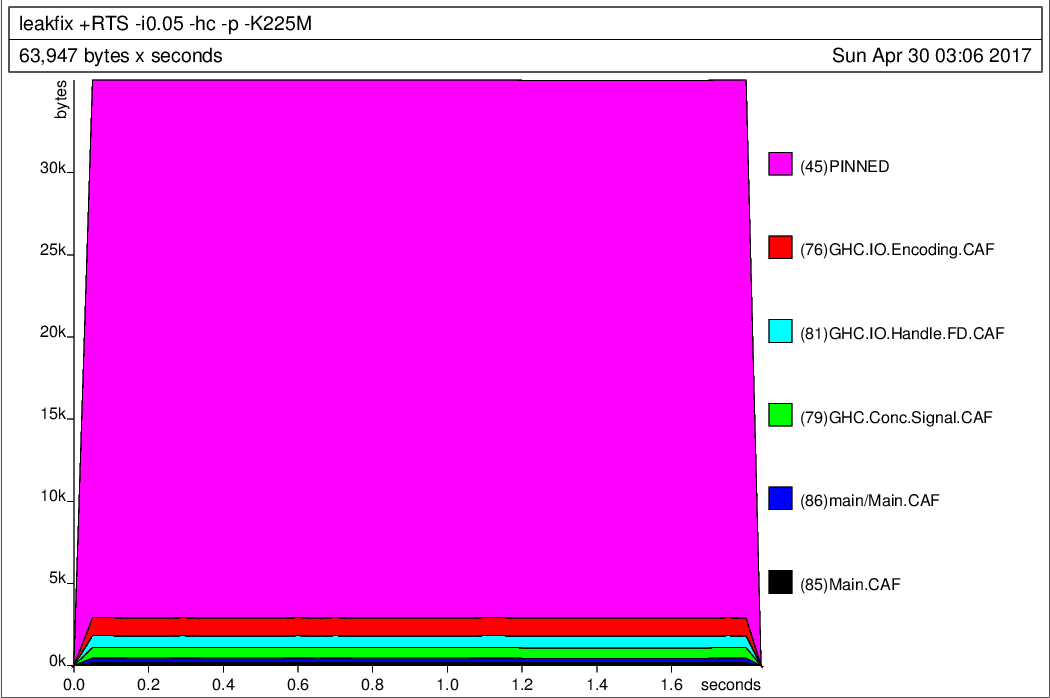
foldr
foldr :: (a -> b -> b) -> b -> [a] -> b
foldr f z [] = z
foldr f z (x:xs) = f x (foldr f z xs)foldr (+) 0 [1..4]
= 1 + (foldr (+) 0 [2..4])
= 1 + (2 + (foldr (+) 0 [3..4]))
= 1 + (2 + (3 + (foldr (+) 0 [4])))
= 1 + (2 + (3 + (0 + 4)))
...
= 10
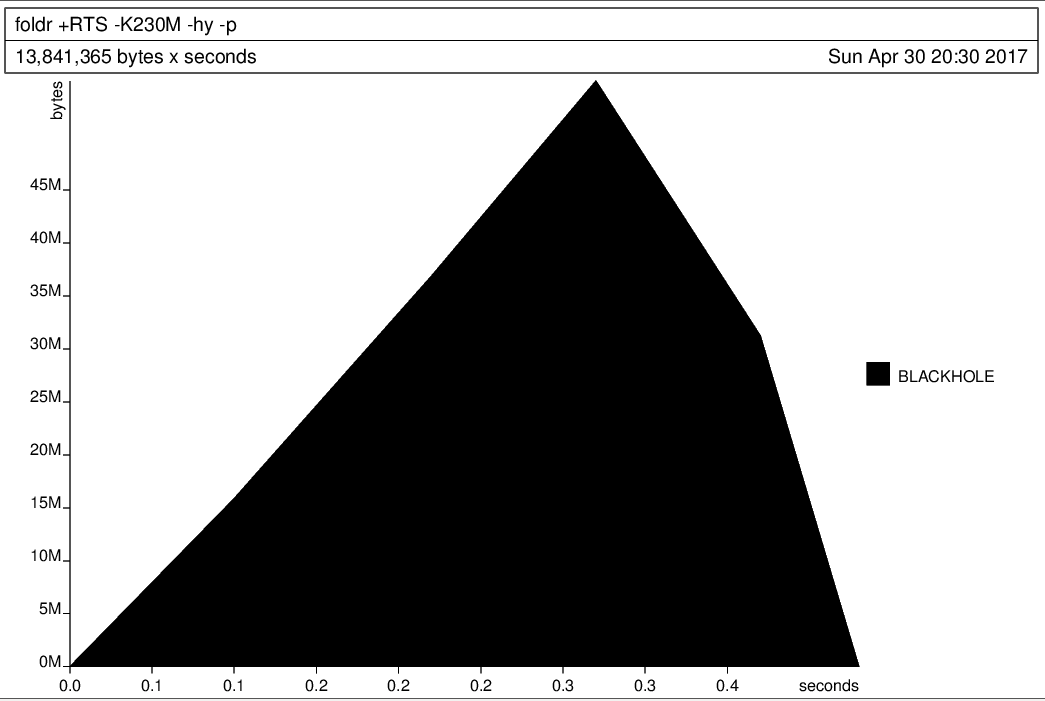
Examples
Liveness based - with fixes
surprise!
surprise :: String -> String
surprise s = let b = break (== '\n') s
in (fst b) + "\nsurprise\n" + (snd b)
break :: (a -> Bool) -> [a] -> ([a], [a])
break f [] = ([], [])
break f x:xs = | x == xs = ([], xs)
| otherwise = let b = break f xs in (x:(fst b), (snd b))
surprise "P not \nequal to NP"
= (fst b1) + "\nsurprise\n" + (snd b1)
where b1 = break (!= '\n') "P not \nequal to NP"
= 'P' + ((fst b1) + "\nsurprise\n" + (snd b1))
where b1 = ('P':(fst b2), snd b2)
b2 = break (!= '\n') " not \nequal to NP"
= 'P' + ' ' + ((fst b3) + "\nsurprise\n" + (snd b1))
where b1 = ('P':(fst b2), snd b2)
b2 = (' ':(fst b3), snd b3)
b3 = break (!= '\n') "not \nequal to NP"
E (fst b) (snd b)
where b = (E1, E2)E E1 E2
= 'P' + ' ' + ((fst b3) + "\nsurprise\n" + (snd b3))
where b3 = break (!= '\n') "not \nequal to NP"garbage
collection
surprise!
- Current GHC version have incorporated Wadler's ideas in the garbage collector
- Bug no longer reproducible
break ls = let (xs, ys) = (SYNCHLIST ls)
in (PAR before '\n' ls, PAR after '\n' ls)
Hughes' solution:
- careless use can lead to deadly issues
- time complexity not necessarily linear
A hack
to detect space leaks
The Method
- Compile the program for profiling
- Run the executable with limiting the stack space
- Find the stack size for which the program just runs
- Reduce the stack space by small amount, run with -xc
- Identify the source of the leak, attempt to fix
- If fixed, should run with small stack space
*** Exception (reporting due to +RTS -xc):
(THUNK_STATIC), stack trace:
Main.h,
called from Main.g,
called from Main.f,
called from Main.main,
called from Main.CAF
Stack space overflow: current size 33568 bytes.main = do print (f [1..1000000])
f [] = 0
f x = 1 + g x
g [] = 0
g x = h (tail x)
h [] = 1
h x = foldl (+) 0 xFlaws with this hack
- Adjacent duplicates are ignored
- Not all functions for imported libraries
- High stack space doesn't mean space leak
- Last function may not be the culprit!
Future work?
- Theoretical work - formalize and then answer interesting questions
- Tool for detecting and fixing space leaks
- Stack space hack++
- Tool for memory analysis - like Chrome heap profiler
Hope you enjoyed!
"Beware of little expenses.
A small leak will sink a great ship."
- Benjamin Franklin
Special thanks to:
- Prof. Amitabha Sanyal
- Dr. Edward Z Yang
- Dr. Neil Mitchell
- Prof. Colin Runciman